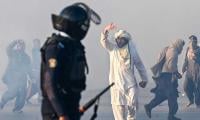KARACHI: Sindh police chief Ghulam Nabi Memon presided over a meeting at Central Police Office on Thursday in which it was decided that a fence would be put up along the Northern Bypass.
The meeting was attended by the DIGs of headquarters, CTD, RRF, West Range, East Range and admin, the AIGs of operations, admin, and the AVLC SSP.
The meeting was informed that the monitoring system at the entry and exit points of Karachi was essential to prevent the movement of criminals, as criminals used these routes to escape after the crime.
IGP Memon ordered police posts and body-worn cameras around the Northern Bypass and other entry and exit routes of Karachi. He further said that the deployment of police on these routes is expected to bring down the crime rate in the city.
All district police officers should activate police posts by deploying police on highways in their respective districts.
The IGP also sought a suggestion from the participants of the meeting for putting up a fence along the Northern Bypass, including the estimate, material and length of the fence.
Later, the IGP met 38 officers from the Senior Management Course at the CPO. The officers were led by Abdul Khaliq Shaikh, chief instructor of the National Institute of Management (NIM) Karachi. The delegation had the opportunity to explore various departments of the Sindh Police and engage with senior officers.
The officers were briefed by DIG Headquarters Zubair on the diverse challenges encountered in modern policing. A key focus of the discussions revolved around the adoption of people-friendly policing strategies, aimed at fostering stronger ties between law enforcement agencies and the community.
IGP Memon shared inspiring insights into the relentless efforts undertaken by the Sindh police to combat crime. He underscored the unwavering support and assistance extended by the Sindh government to this collective endeavour.
He said the Karachi Safe City project is not limited to Karachi, but it is being started from Karachi, and later this project will be extended to Hyderabad, Sukkur, Mirpurkhas and Larkana. The Sindh government and police are going to install fences and cameras at the entry and exits points of Karachi to prevent crime and make the city safe internally and externally.
Furthermore, the IGP reaffirmed the police’s commitment to tackling street crime and said measures would be taken to control it in the near future. As a symbol of mutual respect and collaboration, a commemorative shield was exchanged between the IGP and the chief instructor of the National Institute of Management Karachi during the meeting.
DIG Admin Imran Yaqub visited the Sindh Forensic DNA and Serology Laboratory (SFDL) and the Industrial Analytical Center (IAC) at the International Center for Chemical and Biological Sciences (ICCBS), University of Karachi.
Prof Dr Farzana Shaheen, the director of the ICCBS, along with Dr Ishtiaq Ahmad Khan, the project director and in-charge of the SFDL, and Dr Shakil Ahmed, the in-charge of the IAC, welcomed the police official.
A spokesman for the ICCBS said on Thursday that the DIG had arrived on Wednesday on an official visit, during which he also met Prof Farzana Shaheen and other officials.
In her speech, Prof Farzana Shaheen stressed the need for close coordination between different stakeholders to benefit from the world-class forensic facilities established at the ICCBS. She said that the SFDL regularly organised training programmes for judges, prosecutors, medico-legal officers, crime scene investigators, and investigation officers for the correct collection of samples and effective presentation of evidence in the courts of law.
The ICCBS officials explained the capacity of the SFDL and the IAC to carry out analysis in the full spectrum of forensic DNA and serology, foods, drugs, narcotics, toxicology, and traces, etc. as required in the investigation.
The DIG admin emphasized that all the labs providing services to the police should have a robust quality control system which can be ensured through conforming to the ISO 17025 standards.
Two rounds of meeting were held on Pakistani side of Torkham border’s Zero Point transit terminal
Police says unidentified armed men shot dead former nazim and elder Haji Hameed Gul and managed to escape
Doctors say Khalil Ahmed was stable after transplant, however, his daughter lost battle of life after several days
Various institutions and initiatives are promoting this idea and working to make it a reality
Minister reiterates ordinary Pakistanis will not be denied entry to US
OMAP Chairman Tariq Wazir Ali highlighted potential risks clause poses to financial stability of OMCs







